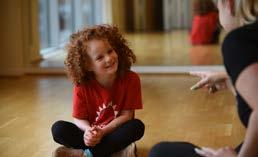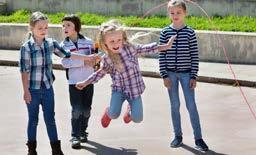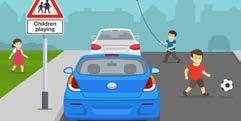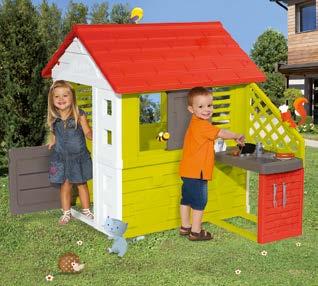

Issue 218 March/April 2023 familiesonline.co.uk South East FREETakeMeHome Easter activities Education What’s On IN THIS ISSUE



Familiesonline.co.uk Families South East London 2
Welcome
The seasons are turning and spring is just around the corner. So it’s time to stop hibernating and re-embrace the big outdoors! You’ll find plenty of opportunities to get out and about in south east London if you take a look at our What’s On guide.
Do you remember when you were young, all those blissful and adventure-filled days playing in the local neighbourhood with the other children that lived nearby? We have some interesting information on how you can offer your child the freedom of ‘playing out’ which these days is much harder to come by. Also in our Health section, we have some top tips from a mum about apps and hacks to make family life healthier.
Of course, Easter is just around the corner and it’s not too soon to start making plans for those all-important egg hunts! Whilst, if you are looking further afield at holiday options overseas for later in the year, we have some interesting ideas for the best value destinations for you to research.
Finally, in this issue, we have Smoby Nature Playhouses to giveaway and you can apply inside. By doing so, you’ll also ensure you receive our digital magazine with lots more content and goodies on offer.
Editor, Families South East
In this issue
Editor Linda Stone editor@familiesselondon.co.uk
020 8241 0423
Sales Patricia Holloway patricia.holloway@familiespublishing.co.uk
07980 556813
Design Rebecca Carr rebecca@familiesmagazine.co.uk
07789 882467
Calling all young Scientists!
Help us discover how babies & kids learn!
We’re recruiting infants from birth through school age to take part in fun studies at Birkbeck’s BabyLab & ToddlerLab in central London. Our prime locations are easy to reach and we refund travel expenses.
We also have online studies you can do from the comfort of home www.cbcd.bbk.ac.uk/online-studies

020 3926 1207 babylab @ bbk.ac.uk www.cbcd.bbk.ac.uk
This product is made of material from well-managed, FSC®-certified forests and other controlled sources.
November/December competition winners
Congratulations to all our winners. You can find a list at https://bit.ly/NOrecipients

Families is a registered trademark of LCMB Ltd, Remenham House, Regatta Place, Marlow Road, Bourne End, Bucks SL8 5TD. The contents of this magazine are fully protected by copyright and none of the editorial or photographic matter may be reproduced in any form without prior consent of Families Print Ltd. Every care is taken in the preparation of this magazine but Families Print Ltd, its distributors, franchisees and LCMB Ltd cannot be held responsible for the claims of advertisers nor for the accuracy of the contents, or any consequences thereof.
} Embedding key values and developing ‘the whole child’ through a unique, continuous five-year curriculum

} Focusing exclusively on cutting edge Early Childhood Education (age 2+ to 7+), the most crucial period in a child’s life
} Transitioning seamlessly from play-based to more structured learning, preparing the children to move on at 7+ with that special Herne Hill School spark
} Expert staff operating under the ethos of Love · Care · Excellence in which children excel and learn with fun and enthusiasm
} Extensive wrap-around care from 7.45am to 4.45/6pm depending on the year group hernehillschool.co.uk enquiries@hernehillschool.co.uk
7274 6336

Familiesonline.co.uk Families South East London 3 CONTENTS
Health Classes & clubs
Outdoors What’s On 4. 8. 10. 11. 12. 13.
Contact us Education
Parenting
Linda
The Old Vicarage 127 Herne Hill London, SE24 9LY
now for Kindergarten from 2+ and Reception Cycle from 3+ The perfect
for your child’s early
Herne Hill School Love • Care • Excellence
020
Apply
setting
schooling:
Helping boys manage the gender gap
 By Catherine Loble and Lisa Wander
By Catherine Loble and Lisa Wander
A 2022 global report shows that boys are increasingly becoming left behind in education. Furthermore, recent school entry baseline assessments show over one million boys are already under-achieving by the time they enter Reception. So what are the reasons behind this?
One key factor is that the male brain is wired to respond in external, rather than internal ways. This leaves boys at a disadvantage in the school environment where teaching focusses on the sedentary development of verbal skills, at the expense of active learning. A calm, controlled classroom is usually the teacher’s end goal but boys tend to learn better by doing rather than sitting.
Both at home and at school, boys participate less in activities such as storytelling and nursery rhymes that support language and literacy development. Even playtime choices affect their development; whilst girls often use make believe and role play activities which further develop their language skills, boys generally choose more physical outlets.
The gender gap is further evidenced by the fact that boys make up around eighty per cent of pupils excluded from schools. They are often easily distracted and less likely to follow instructions.
What is being done to address this? Sadly, our education system does not always get it right and only a minority of schools have been successful in developing specific strategies to raise boys’ attainment. These involve refining approaches to learning and teaching by challenging stereotypical perceptions and making necessary changes to the curriculum.
An excellent model which proves the theories about the different learning styles needed for successful boys’ education is the rapid emergence of Forest Schools. Here educators are seeing young boys excel when allowed to learn in the right environment, mixing physicality with academia. The benefits are limitless and encourage children of both sexes to learn in their own ways.
While it may not be possible to find or have access to the perfect school environment, acknowledging that boys will mature later and have different learning needs and styles and giving them the encouragement and support they need, will help them progress through the school system. Encouragingly, once they are mature and by the time they finish school, the gender gap will have decreased with boys often outperforming their female counterparts at A-Level.
Catherine and Lisa are co-founders of Emparenting (www.emparenting.co.uk), supporting children, parents and families with insights, skills and tools to nurture the development and well-being of the next generation.
Supporting boys from an early age
Provide boys with physical outlets before, after and during school. Any outdoor activity can be a learning opportunity.
Value boys’ achievements to improve self-esteem.
Encourage their confidence by validating their strengths. Understand their strengths and interests.
Find time for family activities, such as board games, baking and crafting, all of which provide excellent opportunities for conversation and chat.
Weave in time for reading for pleasure. Let them choose books based on their interests. Make a variety of genres available including non-fiction and magazines.
Give your son the responsibility of helping with simple chores. Try not to compare. While we know that girls outperform boys up to GCSE, from thereon it becomes a far more even playing field. It is important to give boys time to mature.
Try to find positive male role models or mentors. Often schools will run these schemes and they are a great benefit.
Emotional intelligence supports learning
Emotional intelligence is defined as a person’s ability to express and manage feelings appropriately, while respecting the feelings of others. Studies show that children with high emotional intelligence gain better grades, stay in school longer and generally make healthier choices. All children can be taught emotional intelligence.

Give feelings a label. Children need to recognise them. This helps build up their own emotional vocabulary when approaching others.
Show empathy. Slow down and be less dismissive of how your kids are feeling.

Model appropriate ways to express feelings. Use feeling words in your everyday conversation.
Teach healthy coping skills. You will find plenty of calming techniques online to show kids how to regulate their feelings. Develop problem-solving skills. Help your children work through problems, don’t simply remove them.
Often all our children need is a hug and an acknowledgement of how they feel!
Familiesonline.co.uk Families South East London 4 EDUCATION
Stretching your child’s imagination
By Jemma Z Smith
Imagination is the ability to create mental images, thoughts or ideas. It helps us to generate new ideas, to think creatively and to consider possibilities that may not be rooted in current reality. Imagination can be a powerful tool for problem-solving and innovation.
Imagination is often associated with childhood and is an important aspect of child development. Children use their imaginations to create stories, games and other forms of play in which they explore their environment and learn about the world.
However, imagination isn’t only important in childhood. There are many jobs that rely on imagination and creative thinking. For example, imagination is used by the following professionals in the following ways:
Painters, sculptors, photographers - to create works of art;
Novelists, screenwriters and other writers - to create stories and characters;
Actors - to portray characters and bring stories to life;
Architects - to design buildings and other structures; Graphic designers - to create visual designs for websites, advertisements and other media;
Musicians - to compose music and create new sounds; Game designers - to create interactive games and virtual worlds;
Marketers - to come up with creative marketing campaigns and advertisements;
Teachers - to create engaging lesson plans and activities for their students;

Engineers - to design and build new products and systems.

Imagination takes many forms, including visual imagination to create mental images or pictures, verbal imagination in stories or ideas using words and musical imagination creating melodies and harmonies. It can also involve the use of all five senses, such as when someone imagines the taste, smell, or texture of a food they have never experienced.
By providing opportunities for children to use their imagination and encouraging them to be creative, parents can develop their creative thinking skills.
All imaginative play starts with an understanding of the world around us, so to help a child to use their imagination we must first introduce them to different experiences, from sensory experiences such as discovering new foods or smells, to listening to different accents and instruments. This exposure to the world allows your child to have a large mental ‘dressing up box’ to use when creating characters and scenarios for their imaginative play.
Familiesonline.co.uk Families South East London 5 EDUCATION
Jemma Zoe Smith is Director of The Education Hotel (www.educationhotel.co.uk).
Six reasons children switch off from learning (and how to re-engage them)
By Gail Hugman
Given eleven years of compulsory full-time schooling, it’s not surprising many children come across difficulties that affect their performance and ability to learn and some switch off learning altogether. The reasons for ‘switching off’ can be many and varied. Here are six of the most common I have come across along with steps which can help children re-engage.
Boredom
It is not uncommon for parents to know intuitively that their child could do much better if they applied themselves. Children need three things to help them do this: to understand how schoolwork helps them develop skills, to know which goal to aim for next and to receive positive praise for small as well as big achievements.

Summer born
Summer born babies are the youngest in their class, which can mean up to eleven months’ less experience of life and development. Being in a group of children who are physically bigger and who know and can do more, can affect confidence and self-belief. Talking to your child about the age difference and what it means can help to keep them engaged.
Learning differences
Sometimes children switch off because they have an undiagnosed learning difference. They get by using coping strategies such as copying friends or telling you they ‘read better in their head,’ to hide their embarrassment. Trust your gut instinct if something doesn’t feel right.

Major events
Separation and divorce, bereavement, moving house, illness and the birth of a sibling all disrupt daily life. It takes three years to recover from a major stress event and we can sometimes forget this in the hurly burly. Having a chat to help settle your child’s mind about the event or remind them how much they’ve achieved or changed can help to ‘update’ their brain and refocus on moving forward.
Not knowing who or how to ask for help
A normally enthusiastic 7-year-old child had become reluctant to go to school and his work was starting to suffer. His teacher and parent both noticed the change. When investigated, it turned out that the boy’s desk had been moved next to the window in class
and he was cold! He didn’t know who to tell. Sometimes the most challenging issues have the simplest solutions. Ask your child what’s going on in school. Don’t overthink it; start simple.
Poor concentration
The possibilities for distraction from learning are numerous. Too much screen time can agitate young developing brains; not enough sleep; not understanding or liking a subject; being too hot, too cold, too hungry or chatting with a friend and missing instructions can all lead to concentration issues. It is more important than ever that your child can focus and concentrate well in the classroom.
How to help
Sit down with your child and ask them what they see as their strengths and what they are proud of, then tell them what you see they have achieved in the last year. Ask them what help they would wish for at school if you had a magic wand. By taking an interest and showing you care, this helps get the discussion started to tease out anything on their mind that you can help with.
Gail Hugman is the bestselling author of 100 Things to Learn Before You’re 10. A children’s life coach, she owns and runs Human at Core (www.humanatcore.com), which helps parents motivate and engage their children through science-based, online personal development courses.
Concentration skills
Try a daily brain warm up before school with timed, pacy exercises:
Throw ball to wall and catch or throw ball to person – or hand to hand - and catch.
Trace a simple picture or pattern.
Two minutes - repeatedly copy out and say a times table OR write out spellings.

Two minutes – squeeze a stress ball to release tension and develop hand control.
Two minutes - look at timetable for the day to get the brain ready.
Working memory
Working memory and processing issues are not a measure of intelligence but they slow children down. The good news is children can improve with help. Try these simple daily activities for working memory issues:
Read homework to your child.
Show your child what to do first, what to do second etc and look at each step when finished. Help your child read often to boost confidence. Play memory games frequently.
Familiesonline.co.uk Families South East London 6 EDUCATION
Homework: how you can help
By Zuzu Jordan
Homework is an important part of the learning process but many parents find it difficult to help their children with this for a number of reasons. Sometimes it’s difficult to juggle work and find the optimum time when your child is most productive. Frequently parents feel that ‘the way they teach now’ isn’t how they were taught when they were school age.
Nevertheless, we all want to feel that we have done all we can to steer our children’s education in the right direction.
So what is homework?
Homework covers activities set by the class teacher, which vary from preparing for an upcoming topic, consolidating a lesson already taught or revising for a test. Your role at home is to help your child learn how to work independently, rather than endeavouring to ensure they get full marks.

Consider some of these techniques as a starting point towards a happier homework environment:
Ensure the space helps your child concentrate. A quiet room in the house with a table or desk is preferable. If this isn’t possible, libraries offer quiet spaces and most schools run a homework club. If you don’t have access to a computer or tablet, these are valuable free services.
Establish a routine. If your child works better in the morning when they are more alert, then consider doing some homework before school. This may require a complete change to your morning routine.
Devising a timetable with your child that shows the times for homework across the week can help them see what is expected each day.
All the kit at their fingertips. This is key to ensuring a smooth transition into getting the homework started. Searching for a pencil for half an hour will not help your child stay on track.
Technology can be a great tool. It helps with research and can be also used to revise a concept with which your child may be struggling. More and more schools are setting homework online and expecting children to use a unique login.
Teachers appreciate your input so do ask them for advice if homework is proving a sticking point.
Zuzu Jordan is a Mastery for Maths specialist who has taught primary aged children for sixteen years and is interested in early years and home learning. For free homework and home learning resources, find the Facebook page Edumateuk.
Maths toolbox
Visual and concrete resources boost learning, embed mathematical understanding and are widely used in schools. Providing familiar props at home will help children who are not yet ready to work out homework problems in their heads.
Check you have the following: a number line, hundred square, dice, times tables chart, counters (eg milk bottle lids), protractor, weighing scales, tape measure, clocks (digital and analogue) and a place value chart. A lot of these resources already exist around the home, can be drawn or downloaded.

If you are willing to invest, Numicon, dienes and place value discs are good physical tools which give clear and concrete mathematical examples. Often used in primary school, there are many online resources showing how to use them.
Top Marks (www.topmarks.co.uk) has free online learning games which support classroom teaching across different age groups. Numberblocks (BBC iPlayer) is an engaging, song-filled, animated series designed to help children remember key number facts.
BBC Teach (www.bbc.co.uk/teach) has helpful videos for specific topics, including maths.

www.globalcamps.co.uk

Familiesonline.co.uk Families South East London 7 PAINTING & DECORATING Interior / Exterior • Experienced, Reliable, Clean Fully Guaranteed / Insured FREE ADVICE AND QUOTE John: James & Lamont 020 8462 4646 - 07802 535695 jamlam.john@btinternet.com Would you like to feature your business in our next issue? Book your space today! Call Patricia on 07980 556813 EDUCATION
Ofsted registered Holiday Camp for ages 4-12
How early should my child see an orthodontist?
It is important to take action early if your child’s bite is not right as this is often in a child’s best interests. If planned and implemented at the right time, this modern approach to dentistry can reduce or prevent the need for braces when kids are older.
Treating children much earlier, say between 7 to 11 years old takes advantage of the child’s continuing growth. Recent studies have shown that malocclusions left untreated can result in problems as we age. Crowded teeth are more difficult to brush and floss which may contribute to tooth decay and gum disease. Protruding teeth are susceptible to accidental chipping, while crossbites can result in unfavourable jaw and facial growth and uneven tooth wear. Open bites can result in tongue-thrusting habits and speech impediments.
The good news is that braces are much more comfortable and discreet than they used to be and have become something of a fashion statement, so many children are eager to wear them!
A visit to the orthodontist may be useful if your child has:

• Early or late loss of milk teeth, or excessively spaced teeth;
• Very crowded teeth or extra teeth;
• Teeth crossing at the front or back when biting (crossbite);
• Difficulties with biting into food;
• Mainly breathes through their mouth and can’t fully close their lips;
• Misshapen or angled teeth (the teeth stick out or the teeth meet unusually or not at all);
• Thumb/finger or dummy sucking beyond the age of 4.
The specialist team at Premier Orthodontics is expert at making you and your child feel comfortable and involved in their treatment, taking the time to explain each step fully in a way you will understand and welcoming you and your child’s questions.
Elettra qualified as a Specialist Orthodontist from the prestigious University of Milan in 2013. She has a keen interest in early interceptive orthodontics for children, in addition to teen and adult orthodontics using Damon selfligating braces and Invisalign aligners.
For more information on the types of treatments offered by Premier Orthodontics, to a book a comprehensive consultation or to complete a FREE smile assessment for your child, visit www.premierorthodontics.co.uk or call 0208 460 6464.
New vaccine
trial to protect babies
A new vaccine aimed at protecting babies from a respiratory virus is being trialled at the Royal Free Hospital in London.
RSV (Respiratory Syncytial Virus) is one of the leading causes of hospitalisation in all infants worldwide and affects ninety percent of children before age 2. In recent months, there has been a resurgence of RSV following the easing of Covid 19 public health measures.
The vaccine, Nirsevimab has already been proven to be safe and the larger trial will now test its effectiveness. Babies up to 12 months old are eligible for the single jab, with virtual follow-up appointments. If found to be effective, the new jab could have a major impact on the long term health of thousands of children worldwide.

In most cases, RSV is no worse than a common cold. However, it is the most common cause of bronchiolitis and pneumonia in babies.
More info: www.royalfree.nhs.uk
Familiesonline.co.uk Families South East London 8 HEALTH Distributors Wanted Contact us for more information Linda 020 8241 0423 editor@familiesselondon.co.uk Are you looking for some extra income? Do you have a few hours spare over 1-2 days every two months within school hours? Families London South East Magazine is looking for distributors to deliver our magazine to local schools, nurseries and family attractions. If you live in the area, are reliable and trustworthy, have a car and would like to earn extra money, email editor@familiesselondon.co.uk for more information and the routes available. South East ASK THE EXPERT
Premier Orthodontics in Bromley offers this issue’s specialist parenting advice.
Apps and hacks to keep the family healthy
By Ellie Malt
We can’t be the only family to have been swerving the doctor’s surgery for a while. But ignoring health problems won’t help anyone so I’ve finally booked some overdue appointments. Prevention is always better than cure of course, so I’ve been inspired to look into self-help more closely. Like a kind of digital chicken soup, this basic but hearty recipe is my prescription for the whole family. Take one a day if you like!
Go social
Online communities based around health make it easier to suss out what is working for others. Sometimes you need more than just a prescription and deeper research can either put your mind at rest or offer more information. Facebook is a great place to start and many reputable medical charities, like Young Minds now have groups, often moderated by experts or clinicians and offering helplines.
Register with your GP’s online service
Clearly, I should have done this years ago. If you haven’t yet, go for it because it’s so worth the initial hassle. Once registered, you can book appointments with a few clicks instead of waiting in line on the phone. Also, you can see all available times immediately and re-order repeat prescriptions in mere seconds.
Club living room
Going to an actual sports club seems like a luxury. But joining a class from my own living room is a solid option and certainly beats doing nothing. Things have moved on since Joe Wicks kicked off the pandemic; there are alternatives for every possible taste on The TruFit app (www. trufit.com) and it’s waaaay cheaper than gym membership.
Women’s health apps



Subscribe not prescribe
Getting the best healthcare, even from the NHS, can depend on knowing your options. Keeping up to date with the latest treatments can be as simple as signing up and letting the experts drop into your inbox. For every health problem there will be podcasts, webinars and newsletters.
We mothers are notorious for putting ourselves last and for tolerating the health issues once assumed to be a woman’s fate. A new wave of women’s health apps is banishing or improving monthly aches and pains and menopausal symptoms. Flow (https://flo.health) now has more than 200 million women using it to track their ovulation or periods. Can you imagine the man in your life suffering in silence? Neither should you.
Back to basics
While there are lots of online courses about individual conditions, there is perhaps no better way to be ready for emergencies than doing a general first aid course. I can remember some of the basics but wouldn’t be confident in every situation. First Aid for Free (www. firstaidforfree.com) has a paediatric course online.
Menu update
Wearables
There’s a lot of hype but choose carefully and there will probably be a ‘wearable’ for you. From Fitbits to sleep trackers, physically attaching to something means there is no bunking off from your new healthy ritual. My kids respond well to a low-tech reminders like stickers and postits but it’s fun to experiment.
New health food products pop up all the time - quite literally on my social media feed. I’ve been browsing for gut-friendly alternatives and am experimenting by trying one new product every other week. I’m using gluten free self-rising flour from Doves (www.dovesfarm.co.uk) in our weekend pancakes. None of us have noticed the difference yet. I’m hoping the kids will get used to trying new things; even better if they get involved and help me choose.
Familiesonline.co.uk Families South East London 9 HEALTH
Familiesonline.co.uk Families South East London 9 SUBSCRIBE HEALTH
Spring confidencebuilding fun with Perform
Spring is the perfect time of year to get those feel-good endorphins pumping and Perform’s new summer term themes will get bodies moving and hearts singing. What’s more, your child can try a class for FREE!

Perform offers a different type of children’s drama class. It doesn’t focus on creating perfect dancers or the next child star. Instead, children’s social development is at the heart of its classes, using a specially formulated mix of drama, dance and singing to bring out every child’s true potential.

Exciting termly themes keep young imaginations buzzing while small class sizes ensure lots of individual attention from experienced, professionally trained actors, dancers and singers. Classes are for children of all abilities and they can join at any point in the term; just be ready to have the best fun of the week!

This term, ages 4-7 will be setting sail on the Jammy Dodger in Mermaids & Pirates, whilst ages 7–12 will take part in The Dream, an hilarious adaptation of A Midsummer Night’s Dream.
Classes in Beckenham, Bexley, Bermondsey, Blackheath, Brockley, Bromley, Camberwell, Chislehurst, Dulwich, Eltham, Forest Hill, Greenwich, Herne Hill, Hither Green, Kidibrooke, Lee, Orpington, Petts Wood, Surrey Quays and Woolwich.
Book a FREE class at www.perform.org.uk/try
More about Perform’s weekly classes
Confidence building weekly drama, dance and singing classes for 4-7s and 7-12s. Classes are designed to boost confidence, communication, concentration and coordination. Visit www.perform.org.uk/try, email enquiries@perform.org.uk or call 020 7255 9120 to book a FREE trial class in one of the following venues.
Venues
Beckenham: St George’s Church Hall
Bexley: St John Fisher Catholic Church Hall
Bermondsey: Bermondsey Village Hall NEW
Blackheath: St Michael and All Angels Church Hall
Brockley: St Andrew’s Centre
Bromley: St John The Evangelist Church
Camberwell: Longfield Hall
Chislehurst: Chislehurst Methodist Church
Dulwich: St Stephen’s Millenium Hall, St Barnabas’ Church Hall, Francis Peek Community Room, Goose Green Centre
Eltham: Christ Church Community Centre
Forest Hill: St William of York Catholic Church Hall
Greenwich: The Forum
Herne Hill: The Prince Regent, Carnegie Community Hub
Hither Green: Lochaber Hall
Kidibrooke: St James Rectory
Lee: Church of the Good Shepherd
Orpington: Orpington Methodist Church
Petts Wood: Lakes Wood Hall
Surrey Quays: Time and Talents, Surrey Quays Shopping Centre NEW

Woolwich: Under 1 Roof

Familiesonline.co.uk Families South East London 10 CLUBS & CLASSES
TWO funwaysto learn with FMKC! Learn to read, write & music with love 01732 457 100 Venue-based Keyboard Tuition FREE TRIAL! SE/SW Small groups, 4-8 years Home Keyboard Tuition 5-8 9-12 years Step by step videos at your own pace! www.funkymonkey.info
interoception
By Usha Patel
‘My child is in the 99th percentile for reading but he is not able to tell me when he is hungry or thirsty.’
Traditionally, our mainstream education system tells us that a child is successful when they achieve at curriculum subjects such as reading and writing. We rarely associate academically bright children with learning difficulties or other cognitive issues, so these can often go overlooked in an academically achieving child.
These days, we are more aware of dyslexia and ADHD and how they can affect us but other more subtle difficulties can be difficult to understand. For example, I recently spoke to a parent of an 8-year-old boy who is a very fast learner and enjoys reading, of which his mother is, of course, very proud. However, he struggles a great deal with other things. Every week, there is a near accident in the toilet department; he doesn’t seem to know when he is hungry, cold or thirsty and his teachers report that he is socially aloof. So what could be going on here?
This is a problem with something called interoception and it can be worked on and improved by an experienced and qualified therapist.
What is interoception?
Interoception is better known as our body’s ability to understand messages from our internal organs. This includes the sense that we feel hungry or thirsty. Ignoring or not understanding these feelings can cause all sorts of problems. For example, not understanding when your bladder is full can lead to accidents.
As children grow, they learn to interpret the signals their bodies give them. However, sometimes interoception can be a difficult skill to acquire. Many children and even adults need help to develop this internal intelligence, which is distinct and separate from academic skills such as reading and writing. It is not uncommon for internal intelligence and academic skills to be out of synch.

Developing mindfulness can be very beneficial to us all in understanding how our interoception works. It can be a topdown way to deliver awareness and improve our understanding of our bodies. Giving ourselves the ability to better understand our body’s signals naturally leads to better interoception.
What happens when we can’t tap into our feelings?
Interoception is part of something larger called neuroception, which is our response to all sensory triggers, both internal and external. As it includes our body’s signals and those around us, such as different sensations and noises, it plays a huge part in how we understand if we are safe or not. For example, neuroception is responsible for how we interpret the tones of others’ voices: whether they seem gentle and friendly, or angry and threatening.
Of course, these skills don’t just affect us physically, they also affect how we interpret our emotional state and how we decide to act on our emotions. If we can’t understand our own emotions, we can’t understand those of others either. This leads to awkward social interaction, which is where that sense of aloofness from a person with poor neuroception often comes from, as well as their apparent lack of empathy.
Not feeling safe because we don’t understand how to read the environment and those around us can lead to a poor sense of self and be linked to mental health problems. It’s fortunate that there are ways to help children with this issue.
Usha Patel is a neurocognitive therapist who runs Raviv Practice London (www.ravivpracticelondon.co.uk).
Follow
Building on awareness
This idea of feeling safe is so important and there is a fantastic therapy called the Safe and Sound Protocol which can help a great deal.

By using algorithmically filtered music, this therapy allows the individual’s nervous system to understand and communicate with processes within the body. The ability to tune in to your bodily needs and to appear more connected to others, happens over a period of time and has produced some remarkable results. Read more at www.move2connect.com.
Improving mindfulness

Here is a simple exercise your child can try at home. Sit in a favourite chair with both feet flat on the floor. Have one hand on the navel and the other on the chest. Be still in this position for ten to twenty seconds.
Experience the rise and fall of the tummy and the beating of the heart. Ignore the outside world and enjoy this moment. This is easy to say but not always easy to do. Practice makes perfect!
Familiesonline.co.uk Families South East London 11 PARENTING Understanding
us
Bringing back playing out
For the majority of today’s parents, the best childhood memories don’t involve expensive toys or organised activities. Instead, they remember the simple pleasures of playing and running around outside with their friends. Their strongest and fondest memories recall a magical sense of freedom and possibility.
There have been many studies into the benefits of free, unstructured outside play. Children playing together use their creativity and imagination to create games and invent rules; they learn how to collaborate, share, negotiate and resolve conflicts. They build resilience, independence and social confidence as they learn to navigate the world without adult interference. All valuable experiences as they grow into young adults.
Playing outside is also the natural, joyful way that children are physically active and develop running, balancing, skipping, climbing, jumping and even ball skills at their own pace. You don’t have to ‘make’ children do this; just look at a school playground at breaktime!

In the past, playing outside was the easy, free way that children got all these vital health and wellbeing benefits, every day. All it needed was safe spaces close to home: streets, patches of land, small parks children could get to. It didn’t need money, a car or an adult to take them.
Today things are very different. While screens and ‘lazy’ children or parents often get blamed, one of the biggest barriers is traffic. UK traffic volume has doubled since the 1980s and roads are now seen as ‘just for cars.’ Parental fears are justified, as the numbers of children being killed or injured on our roads is shocking and should be unacceptable in any society.

So what can parents do?

Gardens are safe but not everyone has one. Organised activities are great but not always possible and don’t replace the benefits of unstructured play.
Play streets are one way to reclaim some of the freedom children have lost. By temporarily stopping through traffic on a residential street, neighbours can open up a safe space for children to play together on their doorsteps.
In 2009, a group of Bristol parents closed their street to through traffic for a few hours to give their children some of the freedom they grew up with. Their council then agreed that this could happen every week. The idea began to spread and they set up Playing Out to support other parents and residents do the same.
Playing Out brings more play and freedom into children’s lives in an easy, affordable way. Look into setting up your own space at www.playingout.net.
Children’s health and community Getting started with play streets
Play streets have been spreading across the UK for over a decade now and the positive impact on children is backed up by research: regular extra hours of physical activity, the opportunity to make friends with other neighbourhood children and picking up fun and useful skills such as skipping and riding bikes. In short, all the good benefits of playing out for health and wellbeing that many of us used to have.
Many streets which have been playing out regularly for several years have found that it’s not just the children who benefit; it can bring the whole street community together. Everyone on the street is invited to join in, whether they have children or not.
Friendships between neighbours are formed or strengthened, while older residents often feel less lonely. When Covid left some elderly or unwell people feeling isolated, those living on play streets found that they already had a support network of friends and neighbours on their street.
Play streets aren’t just for children, they’re for everyone on the street!
There are four steps involved with setting up a play street: Consult your neighbours. It’s clearly got to be something that they will either actively embrace or, at the very least, find acceptable.
Apply to your council for permission. Not all councils have policies to support play streets but they can often be persuaded if they can see that there is demand from residents. In these areas, why not start with a street party (for the Coronation perhaps), focus on low key space for play and then take it from there?
Effectively communicate what is happening to everyone on the street.
Release your kids to play out. On the day, volunteer stewards supervise the road closure so that residents who need to can still drive in and out and the disruption to neighbours is minimal. All the information and support you need to take this further is at www.playingout.net
Familiesonline.co.uk Families South East London 12 OUTDOORS
What’s on
Compiled by Robina Cowan
All details are as provided when going to press, however in case of changed plans, do double-check before setting out.
SPECIAL EVENTS
Bring Your Own Baby Comedy
Various venues
www.byobcomedy.com
Top stand-up comedians plus a compere, where baby can come too and join in with the rumpus. For grownups plus 0-12 months.
6 March in Bromley
16 March in Greenwich
20 April in East Dulwich
Vault Festival
In and around Waterloo SE1
www.vaultfestival.com
Until 19 March
An independent festival featuring over 500 of the best live theatre, comedy and cabaret performers, including shows for families and young audiences.

Deptford Literature Festival
In and around Deptford SE8
www.deptfordlitfest.com
18 March
A programme of free events for adults, children, young people and families, featuring authors such as Dapo Adeola and Laurie Bolger taking place at Deptford Lounge, plus a day of free writing and nature activities in Brookmill Park.
Twist Museum
248 Oxford Street W1C 1DH
www.twistmuseum.com
Until 30 March
Put your senses to the test at Twist Museum, a unique, mind-altering world of illusions. Developed in collaboration with artists and scientists, the interactive multisensory experience is a place to learn, explore and enjoy.
Mum2mum Market
Various venues
www.mum2mummarket.co.uk
Nearly new baby and children’s clothes, toys, books and baby equipment.
22 April in Bromley
BBC Earth Experience
Earls Court SW6 1TT
www.bbcearthexperience.com
30 March-31 July
An unforgettable journey through the natural world of our seven unique continents on the most epic scale, with breath-taking footage on multiple screens, narrated by David Attenborough.
Train to be a Teaching Assistant
www.learningunlimited.co
Until June Free, accredited online training for Southwark residents, leading
to a nationally-recognised City & Guilds TA qualification. For more information or to apply for a place, email info@learningunlimited.co
EASTER WORKSHOPS
Funky Monkey Keyboard Classes
Various locations
www.funkymonkey.info

3-6 & 11-14 April
Imaginative, fun-packed half and four-day workshops introduce basic keyboard techniques including reading and writing notes C-G, plus extra fun and games. Ages 4-8.
Global Easter Camp
Sydenham
www.globalcamps.co.uk
3-14 April
A unique mixture of language learning, sports coaching, arts & crafts and outdoor adventure to keep your young ones active and engaged during the school holidays. Ages 4-12.
Perform’s The Jungle Book Dulwich & Blackheath www.perform.org.uk/junglebook Dulwich 3-5 April & Blackheath
12-14 April
Children will enjoy three days of drama, dance and singing at Perform’s Easter holiday course based on The Jungle Book. Children will join Mowgli and friends as they journey deep into the jungle, meeting Baloo the bear, black panther Bagheera and hunting down ferocious Bengal tiger Shere Khan. Topped off with a fabulously colourful final show, it’s going to be the wildest holiday ever! Email enquiries@perform.org.uk or call 020 7255 9120, for more details.
Sydenham Centre SE26 5QX www.spontaneousproductions.co.uk
Weekends 4-26 March
Aladdin
An original musical adaptation of the classic Arabian Nights tale for the whole family. Expect mayhem, mystery and a magical flying carpet!
Woolwich Works
The Fireworks Factory SE18 6HD www.woolwich.works
25 March
Baby Broadway
Sing along to songs from hit musicals and films with West End singers. Bubbles, puppets and dance moves make for an interactive family concert.
31 March & 1 April
The Little Prince
A pilot is stranded in the desert in this enchanting story of love and friendship. Ages 5+.
Greenwich Theatre SE10 8ES www.greenwichtheatre.org.uk
1 April
Ministry of Science: Live!
Dive deep into the world of science and look at how science shapes the modern world we live in, with a few loud bangs along the way!
2 April
Fireman Sam Sam, Penny, Elvis, Station Officer Steele and Norman put on an all singing, dancing, action-packed show.
Familiesonline.co.uk Families South East London 13
THEATRE & SHOWS WHAT’S ON 12 MAR - 23 APR For ages 3 - 6 Stiles & Drewe’s
A DELIGHT The Guardian on Stiles and Drewe’s Three Little Pigs
Music by George Stiles Book and Lyrics by Anthony Drewe
Untitled-1 1 07/02/2023 12:47:36
Performed by arrangement with Music Theatre International Tickets from £9.5
7 April Goldilocks and the Three Bears
A hilarious, pantomine-style show filled with circus and speciality acts.
9 & 10 April
The Little Mermaid
Join Ariel; her father, King of the Seven Seas; Ursula, the evil sea witch and a whole host of fabulous characters in this brand-new song and dance filled adaptation.
13 & 14 April
Dinosaurs and all that Rubbish
An imaginative adaptation of Michael Foreman’s environmental tale with dancing dinosaurs, fuelled by rock’n’roll. This riotous hour will have you tapping your toes from start to finish!
Blackheath Halls SE3 9RQ www.blackheathhalls.com
11 March
The Princess and The Frog
A ballet production by Let’s All Dance featuring a beautiful princess, a very bouncy frog and a fairytale happy ending.
1 April
Teach Rex Live! T-REX Show
Life-size dinosaurs, effects and music give families the chance to get up close and personal with fantastic beasts.
12 April Cinderella
This magical new ballet follows the traditional tale with fresh touches, and is the ultimate fairytale treat for the whole family.
29 & 30 April
The Smeds and The Smoos
Soar into space with this exciting adaptation of the award-winning book by Julia Donaldson and Axel Scheffler, featuring music, laughs and interplanetary adventures.
The Albany SE8 4AG www.thealbany.org.uk
26 March
A Square World
The story of what happens when an unexpected change leaves one of them out in the cold. Ages 3-6.
12 April
I Want My Hat Back
Onstage tales based on Jon Klassen’s book trilogy. Ages 3-6.
23 April
The Instrumentals
A brand new show inspired by the African-Caribbean diaspora. Innovative puppetry and comedy combine in a fun musical journey. Ages 4-8.
Shakespeare’s Globe
New Globe Walk SE1 9DT www.shakespearesglobe.com
Family Workshops
The Globe’s family workshops feature a range of activities and games based on Shakespeare’s best-loved plays.
Until 12 April Macbeth, ages 5-8
Until 14 April Macbeth, ages 9-12
1-5 April The Tempest, ages 9-12
13-15 April A Midsummer Night’s Dream, ages 9-12
Unicorn Theatre SE1 2HZ www.unicorntheatre.com
12 March-23 April
The Three Billy Goats Gruff Step into the magical, fairy-tale world of The Three Billy Goats Gruff in this perfect first musical for young families. Ages 3-6. Southbank Centre SE1 8XX www.southbankcentre.co.uk
11-12 March
WOW: Feminist Corner
Gender equality workshops for girls, as part of the Women of the World Festival. Ages 6-7 and 8-10.
16 April
The Making of the Orchestra
Guided by a sprite, Mason Bates’ multimedia concerto is a joyful introduction to music. Ages 5+.
23 April
OAE Tots: Whizz Zoom to the Moon
The magic of Mozart sends us into orbit in an interactive OAE concert. Ages 2-5.
Sadler’s Wells Theatre EC1R 4TN www.sadlerswells.com
4-15 April
Jungle Book Reimagined
A magical retelling of Kipling’s classic set against the backdrop of climate change.
Last Friday of each month
Family Fridays
Dance workshops for accompanied children, facilitated by a freelance lead and supporting artist and managed by the Learning & Engagement Department. Ages 2-4.
Theatre Royal EC2B 5JF www.frozenthemusical.co.uk
Frozen, the Musical
The stage version of the hugely successful animated Disney film features unforgettable songs from the movie, including ‘Let It Go’ and ‘Do You Wanna Build a Snowman’. Expect spectacular staging, amazing special effects and beautiful costumes in a magical world. Ages 6+.
Bromley Churchill Theatre BR1 1HA
www.churchilltheatre.co.uk
24-26 March
Zog™
The smash-hit stage adaptation of Julia Donaldson and Axel Scheffler’s book is filled with dragons and lively songs. Ages 3+.
3-8 April
The Chronicles of Buster Bunny
Join Buster and Barnaby as they journey through stories big and small. A magical musical show with characters, songs and lots of imagination. Ages 10-7.
Peacock Theatre WC2A 2HT
www.sadlerswells.com
13-16 April
Snow White
London Children’s Ballet brings a cast of 50 young dancers onstage for the classic children’s story, in which the Evil Queen has her comeuppance and Snow White finds ultimate love.
Various dates and venues
Bach to Baby www.bachtobaby.com
Critically-acclaimed classical concerts for babies and their grownups. Outstanding musicians put on exhilarating performances where babies can ‘join in’ with as much noise as they like!
MUSEUMS & GALLERIES
Horniman Museum
London Road SE23 3PQ www.horniman.ac.uk
Until 16 April
Elmer and Friends
Walk through Elmer’s jungle, encountering David McKee’s beloved characters and stories along the way. There are cosy reading areas and dressing up opportunities for the under sevens.
Until 29 October
Brick Dinos
Some of the largest beasts to ever walk the earth have been recreated with Lego bricks by artist Warren Elsmore and his team. Hands-on activities include build your own dinosaur and digging for fossils.
Brunel Museum SE16 4LF www.thebrunelmuseum.com
Housed in the Grade II* listed Thames Tunnel Engine House, the museum celebrates the extraordinary tunnel, viaduct and bridge building engineering of Sir Marc Isambard Brunel and his son Isambard Kingdom Brunel.
1-23 April
Tales of Teredo Navalis
Marc Brunel’s tunnelling shield paved the way for all modern tunnels. But he was only imitating nature! This interactive exhibition will reveal how Marc Brunel was inspired by Teredo Navalis, the humble shipworm!
National Maritime Museum
Greenwich SE10 9NF www.rmg.co.uk/nationalmaritime-museum
Once a month on Saturdays
SENsory Sailors
An explore-the-collection session for families with children with special educational needs and disabilities. Ages 13 and under. Free, book first.
25 March
Safe Harbour
Free workshop sessions created for foster and adoptive families with children aged up to 13.
1-16 April
Ways into Drawing
Play with mark-making and materials to turn drawing on its head. Free workshops, all ages.
Royal Observatory Greenwich Blackheath Avenue SE10 8XJ www.rmg.co.uk/royal-observatory
Various dates
The Sky Tonight
A live show taking visitors on a tour of what can be seen in the night sky, complete with a fly-out to the edge of the visible universe. Ages 7+.
All aboard for a Cutty Sark Easter adventure

Bring the family to Cutty Sark in Greenwich for an actionpacked day out on this world-famous historic ship.
Meet the cast of colourful characters from the ship’s past, including the fearless Captain Woodget and the ship’s cook, as they share stories about life on board the fastest ship of its time.
Find your sea legs by taking the helm at the ship’s wheel, pull the ropes on the main deck and explore the crew’s bunk beds. Play interactive games and visit the Cutty Sark figureheads, part of the world’s largest collection.
Follow a FREE family trail and discover how the ship’s crew lived and worked at sea in the age of sail.
Then treat the family to unforgettable experience by climbing Cutty Sark’s iconic masts to see breathtaking views of London and get a taste of life as a nineteenth century sailor.
Book your Easter tickets at www.rmg.co.uk/cuttysark
Familiesonline.co.uk Families South East London 14 WHAT’S ON
23 April
Drawing the Moon
Join artists and astronomers on a journey to our nearest companion in space, sketching your findings along the way. Ages 7+.
Cutty Sark
King William Walk SE10 9HT www.rmg.co.uk/cuttysark
Half term week and weekends
Cutty Sark Characters
Climb aboard to hear Cutty Sark’s incredible stories brought to life by characters from the ship’s past. Ages 3+.
Various dates

Rig Climb Experience
Climb the famous masts and enjoy views of the Thames and London like no other, taking in the sights from the rigging of a true London icon. Ages 12+.

1 & 2 April
Family Fun Weekend
Learn about etching and design your own scrimshaw-inspired piece of art to take home. All ages.
Dulwich Picture Gallery Gallery Road SE21 7AD www.dulwichpicturegallery. org.uk
Art Sundays
Be inspired to make art together as a family in these free creative workshops at the Gallery.
Family Fridays
Free, expressive art-inspired activities for families.
The Garden Museum SE1 7LB www.gardenmuseum.org.uk
3 April
The Wild Escape
An Art Fund creative children’s workshop. Make wildlife creatures using paper, paint and glue. Ages 3-10.
Natural History Museum Cromwell Road SW7 5BD www.nhm.ac.uk
From 31 March Titanosaur: Life as the Biggest Dinosaur
Step into the world of one of the largest creatures to have ever walked the earth. Learn how Patagotitan mayorum stayed safe, found food and kept cool as you follow its journey from tiny egg to towering head and shoulders above other Cretaceous critters.
THE GREAT OUTDOORS
Beckenham Place Mansion Place Park BR3 1SY www.beckenhamplace.org
7 April Easter Egg Hunt
A family friendly scavenger and Easter Egg Hunt, hosted by Grace Church Beckenham.
Horniman Museum Gardens London Road SE23 3PQ www.horniman.ac.uk
8 April Spring Fair
A day of fun for families, with live music, crafty workshops,


tours and local stalls.
Kew Royal Botanic Gardens TW9 3AE www.kew.org
2-18 April
Easter at Kew Follow an interactive trail through the gardens, with games to identify vegetables and plants.
Hever Castle & Gardens
Edenbridge, Kent TN8 7NG www.hevercastle.co.uk
18 & 19 March
Mother’s Day Weekend
Mother’s Day activities include a family photo booth and celebration lunch or afternoon tea, among the stunning 150 acre grounds.
1-16 April
Easter Quest and Crafts
Children are invited to help the Easter bunny find sweet treats as part of a quest around the grounds or get creative in a free egg decorating workshop.
www.globalcamps.co.uk


Familiesonline.co.uk Families South East London 15 WHAT’S ON Enjoy family activities this Easter on board this world-famous ship. Search ‘Cutty Sark’ Royal Museums Greenwich Cutty Sark | National Maritime Museum | Royal Observatory | The Queen’s House Explore Cutty Sark Cutty Sark Greenwich (only 8 mins from London Bridge) Greenwich Pier
Book at www.perform.org.uk/try Try a FREE drama, dance and singing class CONFIDENCE BUILDING FUN
Ofsted registered Holiday Camp for ages 4-12
East Don’t forget to say you saw these in Families South East Magazine!
DIRECTORY South




Familiesonline.co.uk Families South East London 16 T&CsT&Csapply apply Brings creative play to life - indoors and outside! Smoby Playhouse Smoby Nature Playhouse & Kitchen Magazine APPLY at familiesmag.co.uk/go T&Cs apply 2 available Giveaway! NEXT STOP London Transport Museum Covent Garden Book at ltmuseum.co.uk Discover momentous moments in London’s transport history familyEasterfun 1–16 April KIDS GO FREE 2023.113_M_Easter Ads_Families_180x130mm.indd 1 15/02/2023 18:44








 By Catherine Loble and Lisa Wander
By Catherine Loble and Lisa Wander



































